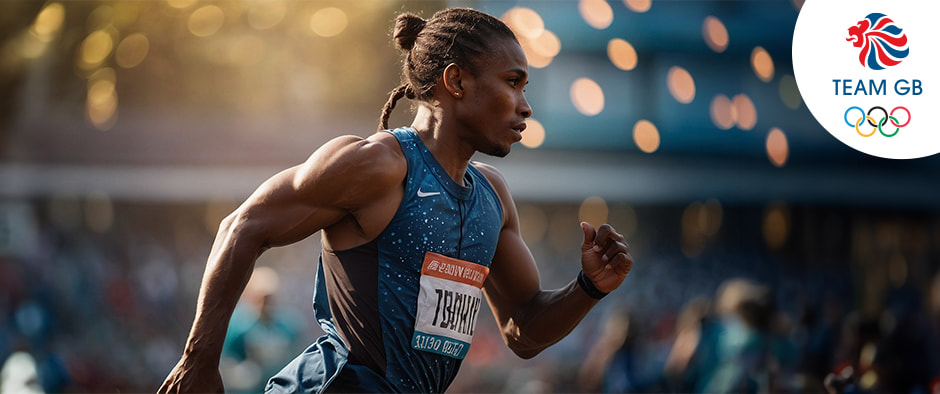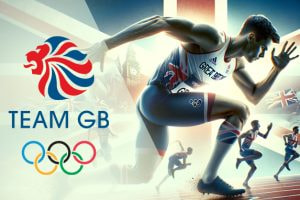Great Britain’s Olympic Journey: From 1908 Dominance to Modern Triumphs
Great Britain’s enduring legacy in the Olympics, marked by a prestigious third place in the cumulative medal tally up to 2020, underscores a journey of resilience and excellence. From its historic 1908 dominance to securing a stronghold in global sports, the UK’s Olympic saga is a testament to its undying competitive spirit and the evolution of ‘Team GB’. Join Luke as he assesses Great Britain’s chances of topping the Olympic medals charts in the future.

Throughout Olympic history, the United Kingdom has never failed to make its presence known at the modern Olympic Games, ascending to a prestigious third place in the cumulative medal tally of the Summer Olympics up to 2020. This illustrious ranking is based on the number of gold medals and the total medal count.
London, in particular, has been the stage for the Summer Olympics three times, specifically in 1908, 1948, and most recently in 2012. With interest in the Olympics so high, it’s no surprise that Olympics betting sites see a surge when British athletes are competing.
Athletes hailing from the United Kingdom unite under the banner of the Great Britain and Northern Ireland Olympic Team, affectionately dubbed “Team GB.” This ensemble is orchestrated by the British Olympic Association, which stands as the National Olympic Committee in the UK.
WORLD CUP GOLD for @TomDaley1994 and Noah Williams!
This Olympic campaign is building nicely 🔥 pic.twitter.com/brMhAhg4bQ
— Team GB (@TeamGB) March 24, 2024
Beyond its primary jurisdiction, Team GB extends its representation to encompass the United Kingdom’s Overseas Territories, excluding Bermuda, the British Virgin Islands, and the Cayman Islands, as well as the three Crown Dependencies: Guernsey, Jersey, and the Isle of Man. Notably, athletes originating from Northern Ireland can compete either for the UK or the Republic of Ireland.
The collective might of British athletes has amassed an impressive total of 950 medals across the board at the Olympic Games, with 916 of these laurels secured at the Summer Olympics.
Here, Team GB distinguishes itself as the sole team to clinch at least one gold medal at every iteration of the games.
While their endeavours at the Winter Olympics have been met with modest success, culminating in thirty-four medals, including twelve golds, the nation’s Olympic journey has seen it clinch the pinnacle of the medal table in 1908, secure second place in 2016, and proudly stand in third at the 1900, 1912, 1920, and 2012 games.
Among the luminaries of British Olympic history, Sir Jason Kenny emerges as the most decorated, boasting seven gold medals and nine medals, all earned in track cycling.
4 Olympic Games
7 golds
2 silvers
1 #TeamGB iconWhat’s your favourite Sir Jason Kenny moment? pic.twitter.com/IZW2BQNUJj
— Team GB (@TeamGB) February 24, 2022
The honour of the most medalled female British athlete is shared between cyclist Dame Laura Kenny and dressage virtuoso Charlotte Dujardin, each adorned with six medals. Within this esteemed circle, Kenny’s haul of five gold medals reigns supreme among British women.
Great Britain Medals at the Summer Olympics
Great Britain’s journey through the Summer Olympics has been a compelling narrative of resilience, strategy, and immense talent, echoing the unpredictability and excitement reminiscent of the most significant sporting events.
From their humble beginnings in the Kingdom of Greece in 1896, Athens, where they secured their footing with a modest yet promising medal haul, to the heights of unprecedented success in recent Games.
| Great Britain Medals at the Summer Olympics | ||||||
|---|---|---|---|---|---|---|
| Games | Athletes | Gold | Silver | Bronze | Total | Rank |
| Kingdom of Greece 1896 Athens | 8 | 2 | 3 | 2 | 7 | 5 |
| France 1900 Paris | 103 | 15 | 8 | 9 | 32 | 3 |
| United States 1904 St. Louis | 3 | 1 | 1 | 0 | 2 | 9 |
| United Kingdom 1908 London | 676 | 56 | 51 | 39 | 146 | 1 |
| Sweden 1912 Stockholm | 293 | 10 | 15 | 16 | 41 | 3 |
| Belgium 1920 Antwerp | 204 | 14 | 15 | 13 | 42 | 3 |
| France 1924 Paris | 307 | 9 | 13 | 12 | 34 | 4 |
| Netherlands 1928 Amsterdam | 234 | 3 | 10 | 7 | 20 | 11 |
| United States 1932 Los Angeles | 74 | 4 | 7 | 5 | 16 | 8 |
| Nazi Germany 1936 Berlin | 225 | 4 | 7 | 3 | 14 | 10 |
| United Kingdom 1948 London | 375 | 3 | 14 | 6 | 23 | 12 |
| Finland 1952 Helsinki | 293 | 1 | 2 | 8 | 11 | 18 |
| Australia 1956 Melbourne | 200 | 6 | 7 | 11 | 24 | 8 |
| Italy 1960 Rome | 252 | 2 | 6 | 12 | 20 | 12 |
| Japan 1964 Tokyo | 199 | 4 | 12 | 2 | 18 | 10 |
| Mexico 1968 Mexico City | 237 | 5 | 5 | 3 | 13 | 10 |
| West Germany 1972 Munich | 310 | 4 | 5 | 9 | 18 | 12 |
| Canada 1976 Montreal | 234 | 3 | 5 | 5 | 13 | 13 |
| Soviet Union 1980 Moscow | 222 | 5 | 7 | 9 | 21 | 9 |
| United States 1984 Los Angeles | 355 | 5 | 11 | 21 | 37 | 11 |
| South Korea 1988 Seoul | 382 | 5 | 10 | 9 | 24 | 12 |
| Spain 1992 Barcelona | 389 | 5 | 3 | 12 | 20 | 13 |
| United States 1996 Atlanta | 303 | 1 | 8 | 6 | 15 | 36 |
| Australia 2000 Sydney | 310 | 11 | 10 | 7 | 28 | 10 |
| Greece 2004 Athens | 270 | 9 | 9 | 12 | 30 | 10 |
| China 2008 Beijing | 313 | 19 | 13 | 19 | 51 | 4 |
| United Kingdom 2012 London | 541 | 29 | 18 | 18 | 65 | 3 |
| Brazil 2016 Rio de Janeiro | 366 | 27 | 23 | 17 | 67 | 2 |
| Japan 2020 Tokyo | 376 | 22 | 20 | 22 | 64 | 4 |
It’s interesting to see that Great Britain has only topped the medal count list at a summer Olympics once, back in 1908, when they first hosted the games. The number of athletes surged from three in 1904 to 676 in London. This tactic paid off; the Brits won 56 golds, 51 silvers, and 39 bronze medals.
The country that finished second, the USA, only won 47 medals (23 gold, 12 silver and 12 bronze), less than half of the British haul. It would be the last time Great Britain won more medals than the USA, except in the 1980 Olympics held in Moscow, which the Americans boycotted.
| Summer Olympic Games – Total Medal Count | ||||
|---|---|---|---|---|
| Team | Gold | Silver | Bronze | Combined Total |
| United States | 1,061 | 830 | 738 | 2,629 |
| Soviet Union | 395 | 319 | 296 | 1,010 |
| Great Britain | 284 | 318 | 314 | 916 |
| Germany | 201 | 207 | 247 | 655 |
| France | 223 | 251 | 277 | 751 |
| Italy | 217 | 188 | 213 | 618 |
| China | 263 | 199 | 174 | 636 |
| Sweden | 147 | 177 | 179 | 503 |
| Japan | 169 | 150 | 178 | 497 |
| Norway | 61 | 52 | 50 | 163 |
As you can see from the table above, the United States are by far the most successful country. They have amassed 2,629 medals at the Summer Olympics, more than double the number of Russia (Soviet Union) with 1,010.
Can Great Britain Top the Summer Olympics Medal Table?
The British Olympic teams from 1896 to 2020 have won 284 golds, 318 silver and 314 bronze medals, giving them 916 medals, enough to make them the third most successful team at the Summer Olympics, 261 medals ahead of Germany in 4th and 94 medals behind the Russians in second.
To answer the question, “Can Great Britain top the Summer Olympics medal table?” the realistic answer is no, as the Americans continue to dominate and if anything, the gulf between the two will increase over the next decade.
A more realistic goal would be for the British to overtake Russia and take second place, which could happen for several reasons.
At the 2004 Summer Olympics, held in Athens, the capital city of Greece, the British performance was poor. They finished 10th overall with nine golds, nine silvers, and twelve bronzes, for a total of 30 medals. The Russians performed much better, with 28 golds, 26 silver and 36 bronze, giving an overall tally of 90. Four years later, at the 2008 Summer Olympics, Great Britain’s 51 medals put them in fourth place overall, nine medals short of Russia in third.
In the 2012 Olympics in London, the Great British team overtook Russia with a total medal count of 65 compared to 66 (but the British won much more gold, 29 compared to 18 for the Russians).
With two gold medals and this performance on the floor, Team GB's @MaxWhitlock1 stole the show at Rio 2016. 🏅🏅🇬🇧🤸♂️#StrongerTogether pic.twitter.com/WyRvBUiLWD
— The Olympic Games (@Olympics) July 8, 2021
There was quite a difference between the two in the following games, the 2016 Summer Olympics. The British team finished second in the medals table behind the USA with 27 gold, 23 silver, and 17 bronze (67 in total). Russia finished in fourth place with 19 gold, 17 silver, and 20 bronze (56 in total).
| Great Britain Medals by Sport (Top Ten) | ||||
|---|---|---|---|---|
| Sport | Gold | Silver | Bronze | Total |
| Athletics | 55 | 83 | 72 | 210 |
| Cycling | 38 | 35 | 27 | 100 |
| Swimming | 20 | 29 | 30 | 79 |
| Rowing | 31 | 25 | 14 | 70 |
| Sailing | 31 | 21 | 12 | 64 |
| Boxing | 20 | 15 | 27 | 62 |
| Shooting | 13 | 15 | 19 | 47 |
| Tennis | 17 | 14 | 12 | 43 |
| Equestrian | 13 | 12 | 15 | 40 |
| Judo | 0 | 8 | 12 | 20 |
As the British perform well in sports offering plenty of medal opportunities (such as athletics, cycling, and swimming), they are on course to overtake the Russians over the next few decades.
However, this overtaking may occur sooner as Russia has been banned from competing in the games. They were initially handed a four-year ban from all major sporting events by the World Anti-Doping Agency (Wada) for state-sponsored doping. The ban was due to end this year but was extended after Russia invaded Ukraine.
The International Olympic Committee announced that athletes from Russia and Belarus who have secured spots for the Paris 2024 Olympics may compete under a neutral status. This decision mandates that these athletes participate without using their national flags, symbols, or anthems. The medals won by these athletes will not be counted as Russian medals. Therefore, Russia’s tally has been effectively frozen since 2016.
With no end in sight to the war in Ukraine, Great Britain could take full advantage. The Brits have brought home more than 100 medals per Olympics in every edition since 2004, so they could even make up the 95 needed this year.



